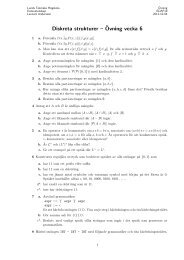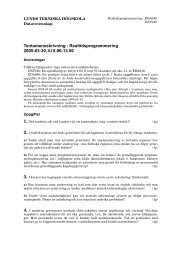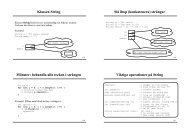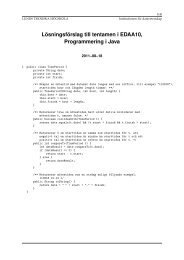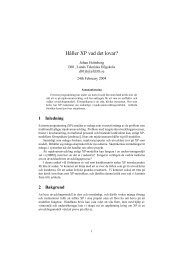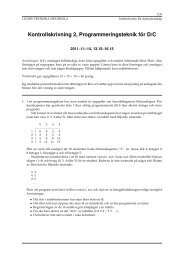JAVA-BASED REAL-TIME PROGRAMMING
JAVA-BASED REAL-TIME PROGRAMMING
JAVA-BASED REAL-TIME PROGRAMMING
You also want an ePaper? Increase the reach of your titles
YUMPU automatically turns print PDFs into web optimized ePapers that Google loves.
3.1.6 Thread interruption and termination<br />
There is much to say about thread termination, but in short there are some<br />
simple rules to follow:<br />
1. Return from the run method terminates the thread. After the run<br />
method (which was called by the thread) returns or runs to its end,<br />
control is back into the system call that started the thread (due to<br />
the call of start). That call then completes by terminating the thread.<br />
Thereafter, calling the isAlive of the terminated thread object returns<br />
false.<br />
2. If one thread wants to terminate another thread, that other thread has<br />
to be prepared to commit suicide. Since there is no predefined methods<br />
for doing this, it has to be accomplished by the programmer, either by<br />
changing some state variable (such as a field/attribute named terminate),<br />
or by interrupting the thread which then (by convention) knows<br />
that it should die whenever interrupted.<br />
3.1. Threads<br />
3. The interrupt method is called in the manner “otherThread.interrupt();”<br />
to interrupt another thread. However, unlike hardware interrupts, the<br />
other thread is not really interrupted; it continues its execution as usual,<br />
except that a predefined internal state variable has registered the interrupt<br />
request.<br />
4. Each thread that should be possible to interrupt has to explicitly test<br />
if it has been interrupted. For this purpose, there is a static method<br />
Thread.interrupted() that returns true if interrupt has been called for<br />
the currently running thread. Note that this method also clears the<br />
interrupt flag. To check if another thread (i.e., not the currently running<br />
one) has been interrupted, isInterrupted() has to be called for that<br />
thread object. That does not effect the interrupted status.<br />
5. If a thread was interrupted when blocked on a blocking system call,<br />
such as sleep, it is scheduled immediately for execution but throwing an<br />
InterruptedException. In this case the interrupted flag is not set, but<br />
by catching the InterruptedException we can determine that the thread<br />
was interrupted. Thus, it is the execution of the catch clause that tells<br />
that the thread was interrupted, and the exception handling decides if<br />
the thread should resume its work or terminate (by returning from run).<br />
6. In accordance with the previous item, if a thread already has been interrupted<br />
when a system call (that throws InterruptedException) is issued,<br />
the exception is thrown immediately without blocking.<br />
Due to these rules, the standard way of implementing a thread is to have a<br />
run method looking like:<br />
51






